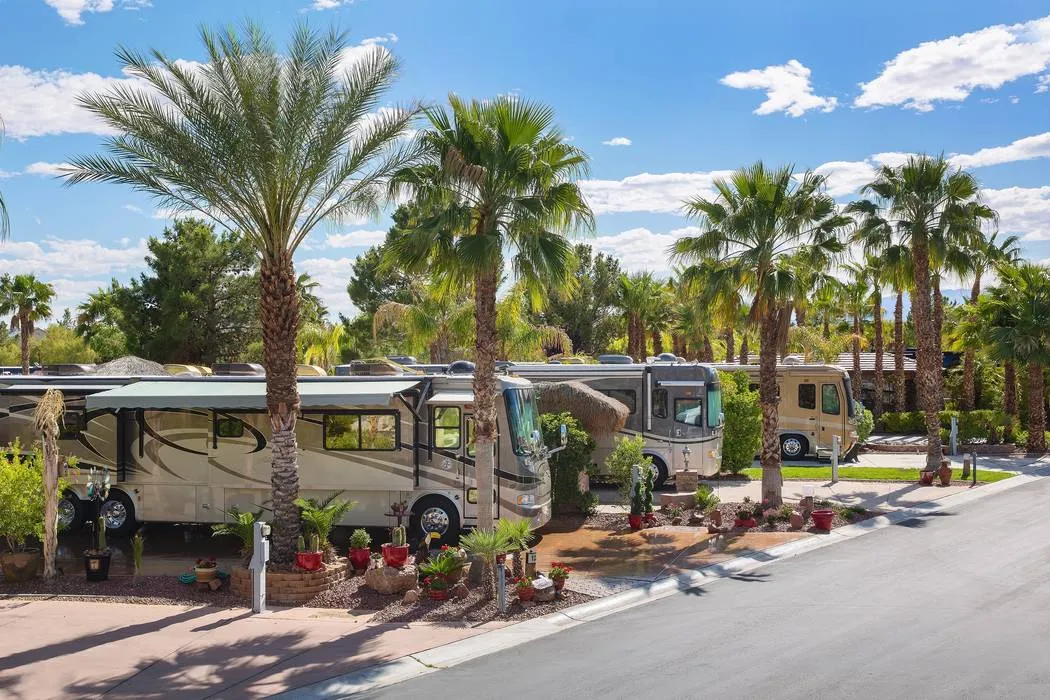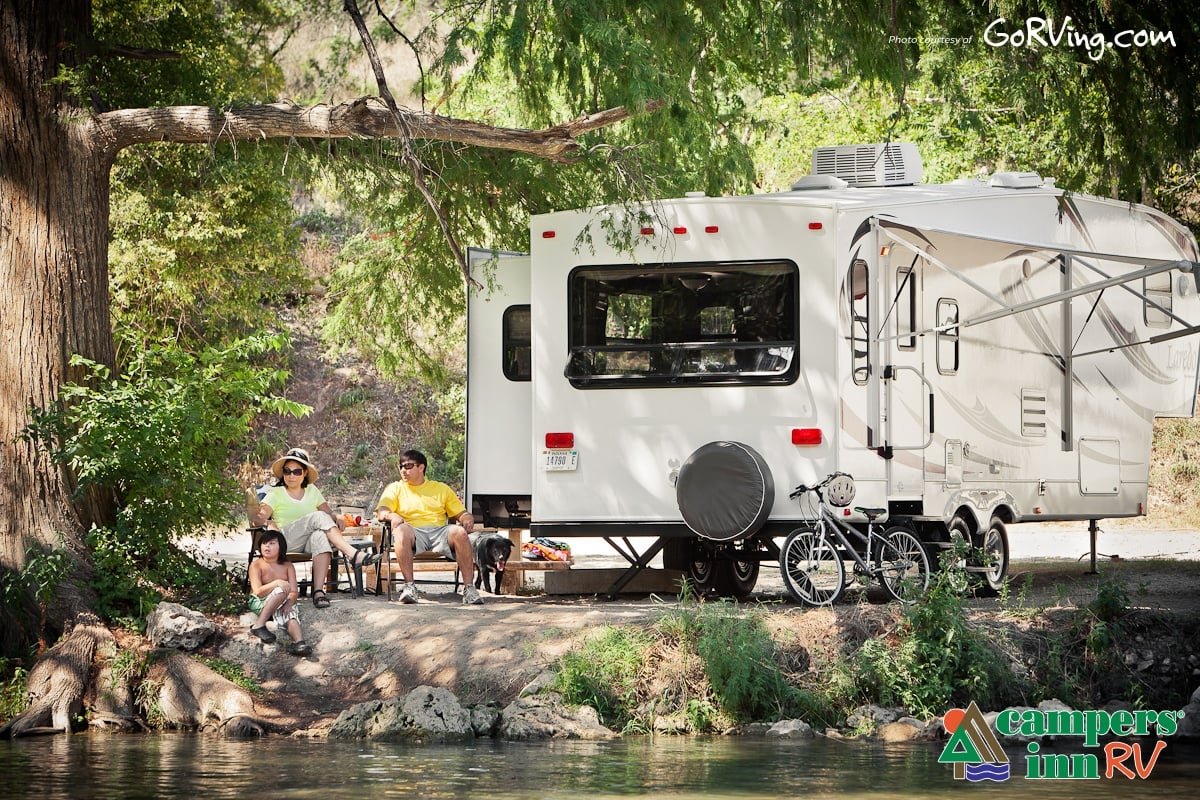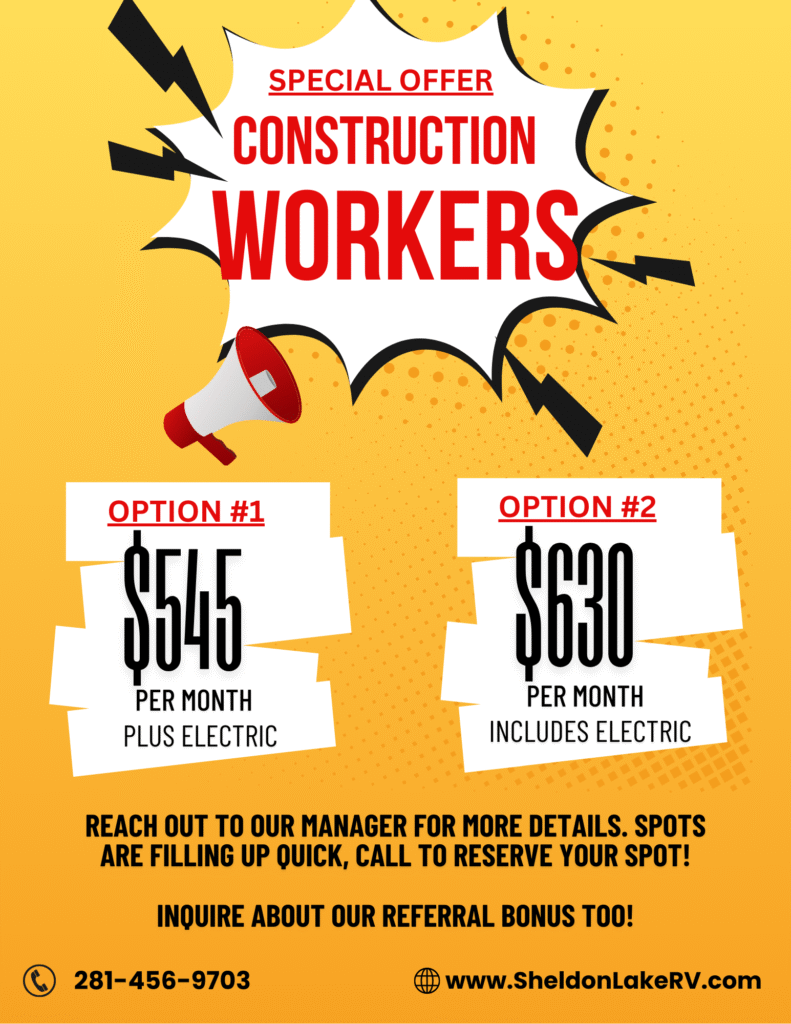Texas has emerged as one of the most popular destinations for full-time RV living, attracting thousands of nomads and retirees seeking an affordable yet diverse lifestyle. The state’s combination of mild winters, abundant RV parks, and no state income tax creates ideal conditions for those looking to make their RV a permanent home.
Texas offers over 1,000 RV parks and campgrounds, many specifically designed for long-term residents with monthly rates ranging from $450 to $800, plus utilities. This extensive network of facilities means RVers can easily find communities that match their preferences, whether they prefer lakeside retreats, urban conveniences, or rural tranquility.
The decision to live full-time in an RV requires careful planning, from understanding state regulations to selecting the right long-term park for individual needs. Texas provides numerous advantages for this lifestyle, but success depends on choosing appropriate locations, understanding costs, and preparing for the unique aspects of permanent RV living in the Lone Star State.
Why Full-Time RV Living Works in Texas
Texas offers unique advantages that make RV living both practical and enjoyable year-round. The state combines affordable living costs, favorable weather, and strong RV communities that support this lifestyle choice.
Benefits Compared to Traditional Housing
Full-time RV living delivers significant financial advantages over conventional homeownership. RV residents eliminate mortgage payments, property taxes, and homeowners insurance costs.
Monthly expenses typically range from $800-2,000 including RV park fees, utilities, and maintenance. Traditional housing costs in Texas cities often exceed $2,500 monthly before utilities.
Key savings include:
- No property taxes or HOA fees
- Lower utility costs due to smaller living spaces
- Reduced maintenance expenses
- Freedom from long-term mortgage commitments
RV living also provides mobility that traditional housing cannot match. Residents can relocate for job opportunities, seasonal preferences, or lifestyle changes without selling property.
This flexibility proves especially valuable for remote workers, retirees, and professionals in industries requiring travel.
Year-Round Mild Climate and Natural Beauty
Texas weather supports comfortable RV living throughout most of the year. Winter temperatures rarely drop below freezing in southern regions, eliminating concerns about frozen pipes or extreme heating costs.
Spring and fall offer ideal outdoor living conditions with temperatures in the 70s and 80s. Summer heat, while intense, is manageable with proper RV cooling systems and shaded park sites.
The state’s diverse landscapes provide endless exploration opportunities. Natural attractions include:
- Gulf Coast beaches and fishing areas
- Hill Country vineyards and scenic drives
- East Texas forests and lakes
- Desert landscapes in West Texas
State parks offer affordable camping options with full hookups. Many parks provide monthly rates under $500, making extended stays budget-friendly.
Texas also maintains extensive highway systems that accommodate large RVs, making travel between destinations safe and convenient.
Flexible and Affordable Living
The cost of living in Texas remains below the national average, extending these savings to RV residents. Fuel costs, groceries, and services typically cost less than in coastal states.
RV park options range from basic facilities at $400 monthly to resort-style communities exceeding $1,200. This variety allows residents to match housing costs to their budgets and lifestyle preferences.
Affordable living factors include:
- No state income tax
- Lower sales tax rates than many states
- Competitive fuel prices for travel
- Abundant discount shopping options
Many Texas employers welcome remote workers, supporting the growing community of fellow digital nomads and telecommuters. This trend creates networking opportunities within RV communities.
Seasonal flexibility allows residents to escape harsh weather in other regions while maintaining Texas residency benefits.
Diverse RV Communities and Lifestyle
Texas hosts thriving RV communities that cater to different lifestyles and interests. Long-term parks often develop tight-knit neighborhoods where residents form lasting friendships.
Many communities organize social activities, hobby groups, and support networks. These connections help newcomers adapt to RV living while providing ongoing social interaction.
Community types include:
- Age-restricted parks focused on retirees
- Family-friendly resorts with children’s activities
- Working professional communities near major cities
- Seasonal parks catering to snowbirds
Facilities like Sheldon Lake RV provide examples of communities that blend natural beauty with modern amenities. These parks offer hiking trails, fishing access, and wildlife viewing alongside full RV services.
The diversity of communities means residents can find groups that match their interests, from country living enthusiasts to urban professionals seeking convenient city access.
Essential Considerations for RV Living in Texas
Moving to live in an RV full-time in Texas requires understanding legal residency requirements, local zoning laws, insurance needs, and the state’s diverse climate conditions. These factors determine where you can park legally and what preparations are necessary for year-round comfort.
Legal Requirements and Residency
Texas allows full-time RV living without state-level restrictions, making it attractive for those seeking an alternative lifestyle. Residents must obtain a Texas driver’s license within 90 days of establishing residency. Vehicle registration follows the same timeline.
Establishing legal residency requires:
- Physical address for official documents
- Texas voter registration
- Updated bank accounts and financial records
- Filing state tax returns as a Texas resident
Many RV parks provide physical addresses for residents, though some require additional mail forwarding services. Sheldon Lake RV offers address services for long-term residents establishing Texas domicile.
Domicile requirements include:
- Spending significant time in Texas annually
- Demonstrating intent to remain permanently
- Maintaining Texas-based financial accounts
- Registering to vote in the state
Licensed RV parks typically provide the most straightforward path to legal residency. Private property arrangements may require additional documentation and compliance verification.
Local Regulations and Zoning
While Texas state law permits RV living, local regulations may impose restrictions on where and how long residents can stay. Cities and counties maintain separate zoning ordinances that affect RV placement and occupancy.
Common local restrictions include:
- Maximum stay durations at RV parks
- Parking limitations in residential areas
- Distance requirements from schools or businesses
- Permit requirements for extended stays
Homeowner associations frequently prohibit RV parking in residential neighborhoods. These rules and regulations apply even to property owners within HOA boundaries.
Some municipalities require special permits for RV park operations, affecting availability and pricing. Rural areas typically offer more flexibility than urban centers like Austin or Houston.
Before selecting a location, residents should verify:
- Local zoning compliance
- HOA restrictions if applicable
- Municipal parking ordinances
- County-specific RV regulations
Working with established RV parks ensures compliance with local requirements and reduces legal complications.
Insurance, Utilities, and Mail Services
RV insurance differs significantly from traditional homeowner’s policies, requiring specialized coverage for mobile living situations. Full-time RV residents need comprehensive policies covering personal property, liability, and temporary living expenses.
Essential insurance components:
- Full replacement cost coverage
- Personal liability protection
- Emergency expense coverage
- Roadside assistance programs
Property taxes apply differently to RV residents compared to traditional homeowners. RVs are typically classified as vehicles rather than real estate, affecting tax obligations and benefits.
Utility considerations include:
- Electricity hookup capacity and costs
- Water and sewer connection fees
- Internet and cable service availability
- Propane delivery and storage options
Most RV parks include basic utilities in monthly fees, though electricity usage may incur additional charges during peak seasons. Climate control costs can be substantial during Texas summers.
Mail services require careful planning for full-time residents. Many use mail forwarding services combined with RV park addresses to ensure reliable delivery. Digital banking and online bill payment reduce physical mail requirements significantly.
Climate and Weather Preparedness
Texas weather presents unique challenges for RV residents, with extreme heat in summer and occasional winter freezes requiring specific preparations. Temperatures can exceed 100°F for extended periods, demanding robust air conditioning systems.
Summer preparation essentials:
- High-capacity air conditioning units
- Adequate electrical systems for cooling
- Proper insulation and window coverings
- Ventilation fans for air circulation
Winter weather, while generally mild, can bring sudden temperature drops and occasional ice storms. RVs require winterization measures during cold snaps to prevent pipe damage.
Cold weather considerations:
- Pipe insulation and heat tape
- Adequate heating systems
- Fresh water tank protection
- Skirting for underneath protection
Severe weather events including tornadoes and hailstorms occur throughout Texas. RV residents need emergency plans and access to sturdy shelter during weather warnings.
Weather monitoring tools:
- NOAA weather radio systems
- Mobile weather apps with alerts
- Local emergency notification systems
- Communication devices for emergencies
Proper preparation ensures the comforts of home remain available regardless of weather conditions, making full-time RV living sustainable year-round.
How to Choose a Long-Term RV Park in Texas
Selecting the right long-term RV park requires careful evaluation of park types, location benefits, lease agreements, and community atmosphere. Texas offers diverse options from luxury resorts to budget-friendly communities, each with distinct advantages for extended stays.
Understanding Types of RV Parks and Resorts
Texas RV parks fall into several categories that cater to different lifestyles and budgets. Traditional RV parks focus on basic utilities and essential amenities, while luxury RV resorts like those operated by Jetstream provide upscale facilities including fitness centers, pools, and clubhouses.
Park Categories:
- Budget Parks: Basic hookups, minimal amenities, rates $25-40/night
- Mid-Range Parks: Standard amenities, community areas, rates $40-60/night
- Luxury Resorts: Premium facilities, concierge services, rates $60-100+/night
- Age-Restricted Communities: 55+ parks with specialized activities
Many RV parks offer different site types including pull-through sites for larger rigs, back-in sites for smaller units, and premium waterfront locations. Some parks like Sheldon Lake RV provide specialized accommodations for specific RV sizes and configurations.
Resort-style properties typically include golf courses, marinas, or recreational facilities that justify higher monthly rates. These locations often attract long-term guests seeking an active lifestyle with organized events and social activities.
Evaluating Location and Amenities
Location determines access to healthcare, shopping, entertainment, and outdoor activities. Urban parks near Houston or Dallas provide city conveniences, while rural locations offer natural settings and lower costs.
Essential Location Factors:
- Proximity to medical facilities
- Shopping and grocery access
- Internet connectivity quality
- Transportation options
Amenity evaluation should align with personal priorities and lifestyle needs. Full-time RVers typically require reliable laundry facilities, strong Wi-Fi, and adequate storage space for extended stays.
Priority Amenities for Long-Term Stays:
- Utilities: 50-amp service, reliable water pressure, sewer connections
- Communication: High-speed internet, cell tower proximity
- Convenience: On-site laundry, mail service, package delivery
- Recreation: Pool, fitness facilities, pet areas
Climate considerations affect comfort and utility costs. South Texas locations offer winter warmth but higher summer cooling expenses. Hill Country parks provide moderate temperatures with scenic surroundings.
Lease Terms and Long-Term Stays
Long-term RV park agreements vary significantly in structure and flexibility. Monthly leases typically range from $400-1200 depending on location and amenities, while annual agreements often provide substantial discounts.
Common Lease Structures:
- Month-to-month: Maximum flexibility, higher rates
- 6-month agreements: Moderate savings, seasonal options
- Annual leases: Best rates, commitment required
- Seasonal contracts: Winter/summer specific terms
Many RV parks offer graduated pricing where rates decrease with longer commitments. Some facilities require security deposits equivalent to one month’s rent, while others waive deposits for extended stays.
Pet policies, guest restrictions, and RV age limits affect long-term feasibility. Certain parks restrict RVs over 10-15 years old, while others welcome vintage units. Guest policies range from unlimited visits to restricted overnight stays.
Utility inclusions vary by park, with some including electricity up to specific usage limits while others charge separately for all utilities beyond basic hookups.
Building a Supportive RV Community
RV communities provide social connections and mutual support that enhance long-term living experiences. Established communities often feature regular activities, shared interest groups, and informal neighborhood watch systems.
Active communities organize potluck dinners, game nights, exercise classes, and seasonal celebrations. These activities help newcomers integrate quickly and build lasting friendships with fellow residents.
Community Indicators:
- Resident-organized activities
- Community bulletin boards
- Informal gathering spaces
- Long-term resident retention
Park management style influences community atmosphere significantly. Hands-on managers who know residents personally often foster stronger communities than corporate-managed facilities with frequent staff turnover.
Some RV parks designate specific areas for long-term residents, creating neighborhood-like environments separate from transient camping areas. These sections often feature landscaping, designated parking, and storage sheds that enhance the home base feeling.
Resident demographics should align with personal preferences regarding activity levels, age groups, and lifestyle choices. Some communities attract working professionals, while others cater to retirees seeking social engagement and recreational activities.
Top Long-Term RV Parks and Destinations in Texas
Texas offers exceptional long-term RV options across diverse regions, from the scenic Hill Country to coastal areas and major metropolitan zones. Full-time RVers can find parks with comprehensive amenities, competitive monthly rates, and year-round availability.
Popular Regions: Hill Country, Gulf Coast, Cities
The Texas Hill Country stands out as a premier destination for long-term RV living. Oak Meadows RV Park near Canyon Lake provides 22 full hookup sites in a peaceful setting. The region offers mild winters and scenic landscapes perfect for extended stays.
Horseshoe Ridge RV Resort features 124 full-hookup sites with resort-style amenities including pools and modern lounges. The Hill Country’s natural beauty makes it ideal for those seeking tranquil long-term accommodation.
The Gulf Coast region attracts winter Texans and full-time RVers year-round. Texas RV Park in Hitchcock offers full hookups with concrete pads and monthly rates starting at competitive prices. South Padre Island KOA provides waterfront living with beach access.
Major cities like Houston and Austin offer urban convenience with nearby RV parks. Grand Texas RV Resort north of Houston provides luxury camping with 30/50-amp service and strong Wi-Fi. These locations offer access to healthcare, employment, and entertainment while maintaining RV lifestyle benefits.
Best Parks for Full-Time RVers
Sun Outdoors Lake Travis (formerly La Hacienda RV Resort) ranks among Texas’s top long-term facilities. The park offers swimming pools, hot tubs, fitness centers, and dog parks with year-round availability.
Spring Creek Marina & RV Park accommodates 125 spacious sites with full hookups including cable TV. The facility accepts double slide-outs and provides marina access for water activities.
Shady Creek RV Park serves both short-term visitors and long-term residents with full hookups including 30/50 amp electricity. The resort features swimming pools, fitness centers, and private fishing ponds.
Hidden Oaks RV Park in Conroe offers family-owned hospitality with 60+ sites mixing pull-through and back-in options. Monthly rates start at $400, making it affordable for extended stays.
Pecan Park Riverside RV Park provides indoor pools, hot tubs, and water activity access. The facility caters specifically to long-term guests with enhanced amenities beyond basic hookups.
Tips for Booking Long-Term RV Spots
Research seasonal availability before booking. Many Texas parks operate year-round, but some close during winter months. Contact parks directly to confirm long-term policies and availability windows.
Compare monthly rates across different regions. Hill Country parks typically charge premium rates for scenic locations, while Gulf Coast and city-adjacent parks offer more competitive pricing. Hidden Oaks charges $400 monthly while premium locations may exceed $800.
Verify hookup specifications match your RV requirements. Ensure parks provide appropriate amp service (30/50), water pressure, and sewer connections. Confirm Wi-Fi strength if remote work is essential.
Ask about deposit requirements. Many parks require electric deposits ranging from $100-200 for monthly stays. Some facilities offer discounted rates for extended commitments beyond single months.
Visit parks before committing to long-term contracts. Inspect site conditions, measure space for slide-outs, and evaluate neighbor proximity. Many parks allow short-term stays before transitioning to monthly arrangements.
Frequently Asked Questions
Texas allows full-time RV living with specific legal requirements, parking regulations, and registration processes that vary by location. Long-term RV parks offer extended stays with established rules, while some areas provide opportunities for free parking on certain lands.
What are the legal requirements for living in an RV full-time in Texas?
Texas requires RV residents to register their vehicle with county authorities, maintain liability insurance coverage of $30,000 per person and $60,000 per incident for bodily injury plus $25,000 for property damage, and establish a legal domicile address for taxation and voting purposes.
Can I legally park and live in an RV on my own land in Texas, and if so, how long?
Property owners can legally park and live in an RV on their own land indefinitely after registering the RV with appropriate county authorities and ensuring compliance with local zoning ordinances and city regulations.
What are some top-rated long-term RV parks in Texas for full-time living?
Quality RV Resorts near Houston offers monthly stays with all-inclusive amenities, while Sheldon Lake RV provides long-term options, and various parks throughout Dallas, Austin, San Antonio, and Arlington accommodate extended residency with modern facilities.
Are there any new RV laws in Texas that impact full-time RV residents?
Texas Penal Code Section 48.05 prohibits camping in public spaces without permission and requires advance reservations at most state parks and recreational areas, with penalties for unauthorized camping on public property.
What do RV park rules typically include for long-term stays in Texas?
Long-term RV park rules typically include lease terms ranging from six months to one year, utility connections, community amenities access, pet policies, visitor restrictions, and maintenance requirements for the RV site.
How can one find RV living spaces in Texas that allow for free long-term parking?
Free long-term parking options include dispersed camping on public lands like national forests with stay limits, boondocking on private property with owner permission, and certain state parks allowing stays up to 180 days depending on individual park regulations.




